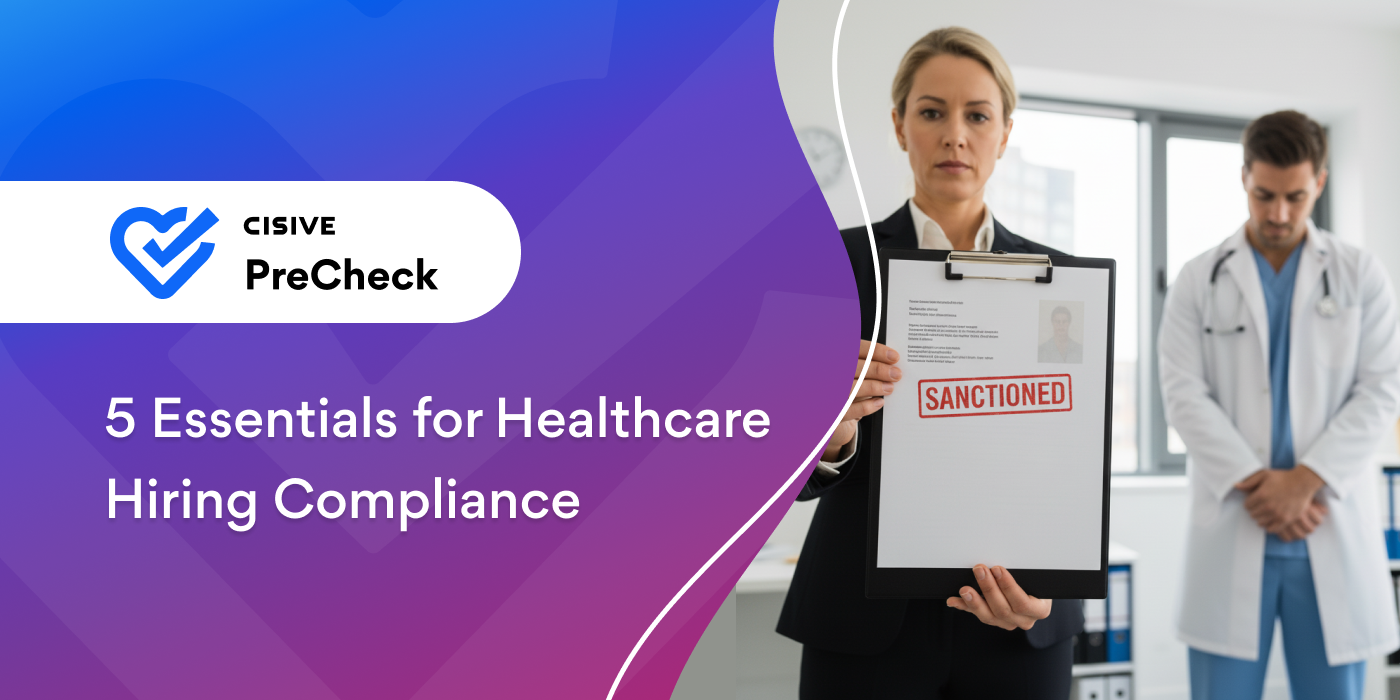
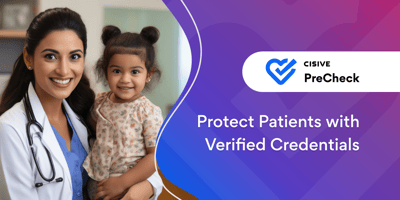
As a Medical Staff Professional, you know how important it is to vet providers thoroughly. After...

Hiring in healthcare carries a higher standard of responsibility than almost any other field. When even one unqualified or unvetted individual enters a clinical environment, the consequences can reach far beyond compliance, affecting patient safety, trust, and the organization’s reputation.
Across the U.S., disqualifying offenses in healthcare define who can and cannot be employed. Screening for these offenses requires more than the typical background check because they directly address patient vulnerability, access to controlled substances, and the ethical demands of care. Understanding which offenses apply, and how federal and state rules overlap, can be complex.
Employers who rely on outdated or incomplete screening risk serious penalties. The U.S. Department of Health and Human Services’ Office of Inspector General (HHS OIG) can impose civil fines, reimbursement loss, or program exclusion if an organization employs an individual barred from federal healthcare programs. According to industry analyses, more than 25% of healthcare organizations fail to check all sanction lists, which can result in costly investigations and reputational harm.
Key TakeawaysHere are the key things you need to know about disqualifying offenses for healthcare:
|
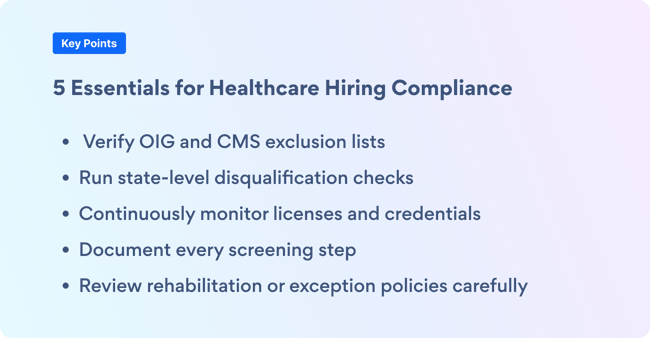
Healthcare hiring is never just administrative. Every decision touches patient care, safety, and compliance. A single oversight in checking backgrounds or reviewing licenses can jeopardize lives and funding. The OIG and CMS enforce these standards aggressively by penalizing facilities that employ excluded individuals, even by mistake.
Understanding disqualifying offenses isn’t just about risk avoidance; it’s also about trust. Healthcare organizations that verify who’s eligible to serve — and who isn’t — strengthen their credibility, protect their teams, and maintain the integrity that patient care demands.
Disqualifying offenses matter most when it comes to patient safety. A clinician with a record of abuse, neglect, or violence shouldn’t have access to vulnerable patients, whether in a hospital, nursing home, or other setting.
Patient harm is the ultimate failure of compliance. That’s why exclusion checks and license monitoring are essential safeguards. Cisive PreCheck’s automated screening raises red flags before you make an offer, keeping patients safe and organizations compliant.
This one is short because the point is simple: If you don’t know who you’re hiring, you can’t protect your people.
Healthcare settings are already at risk for violence from patients or visitors, and failing to screen candidates and employees can add further risk. Screening for violent or harassment-related offenses increases workplace safety and peace of mind. Continuous healthcare license monitoring maintains that vigilance by flagging new sanctions or violations in real time.
Compliance gaps can quietly unravel staffing stability. When an employee is disqualified post-hire, the sudden loss can push an already short-staffed team past its limits.
That’s why proactive screening matters just as much as post-hire monitoring, supported by drug and occupational health testing that ensures every employee is fit for duty before the first shift. Building compliance into the hiring process helps maintain patient coverage and keep turnover low — no scrambling, no burnout, no repeat mistakes.
PreCheck helps healthcare employers maintain safe staffing ratios by verifying licenses and credentials in real time, including early student background checks and immunization tracking, to keep staff compliant and ready to work.
Liability is one of the biggest pitfalls of weak screening. Every overlooked offense is a potential claim, whether financial, civil, or criminal. CMS can issue fines under 42 CFR Part 455 for employing disqualified individuals, and reputational damage and legal exposure can cost even more.
Detailed and automated documentation offers the best protection. PreCheck’s systems provide audit-ready records for every background check, along with license verification and exclusion review, providing proof of due diligence to compliance officers.
Reputation takes time to build, but it can be lost quickly. In healthcare, one publicized compliance failure can undo years of credibility. Patients don’t separate safety and ethics.
A disciplined, transparent screening program sends a clear message: Safety isn’t negotiable. Partnering with PreCheck shows regulators, employees, and patients that your organization holds itself to the highest standard, setting the foundation for lasting trust.
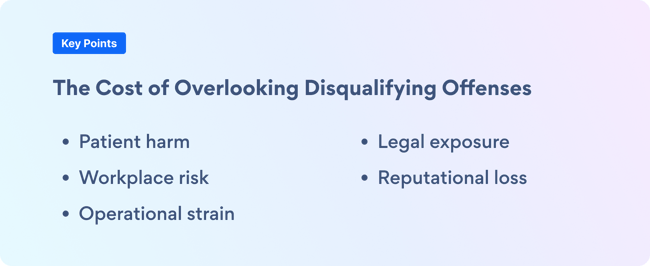
Healthcare hiring isn’t governed by one rulebook, but rather by a web of overlapping federal and state mandates. Every credential, license, and background check is bound by regulations designed to protect patients and public funds. For HR and compliance teams, no single checklist applies nationwide. Even a Level 2 background check for healthcare workers may not capture every federal and state requirement.
At the federal level, the HHS Office of Inspector General (OIG) and the Centers for Medicare & Medicaid Services (CMS) set the baseline. The OIG’s List of Excluded Individuals and Entities (LEIE) permanently bars anyone convicted of healthcare fraud, patient abuse, or serious financial crimes from working in federally funded programs. CMS regulations under 42 CFR Part 455 extend those requirements to Medicaid providers, mandating verification of every employee’s integrity before reimbursement.
Other offenses, such as certain drug or property crimes, might not automatically exclude someone but can trigger case-by-case reviews based on rehabilitation, job relevance, and state policy. The intent is clear: Protect patients, prevent fraud, and keep public dollars safe.
States add their own layers. Florida enforces one of the strictest lists of disqualifying offenses, while California allows conditional review for some criminal convictions. Texas applies a “reasonable relationship” test between the offense and the job’s duties, while New York’s Clean Slate Act requires employers to consider rehabilitation before denial.
Understanding these differences sets the stage for what matters most — detecting any such offenses and understanding how they play out in real healthcare environments.
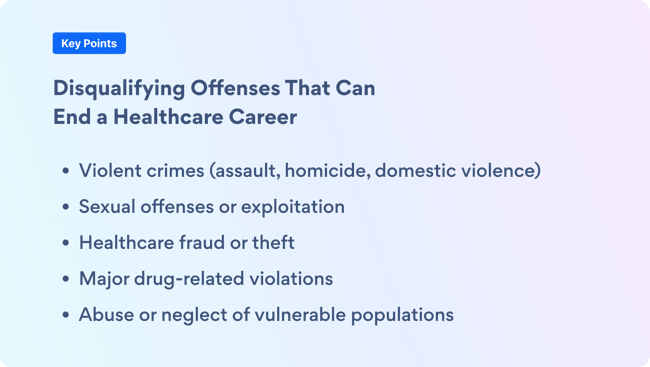
There’s no single list of disqualifying offenses in healthcare. Instead, there are categories of conduct that regulators agree pose too much risk to patient care and public trust. Some offenses trigger automatic bans; others allow for review, depending on evidence of rehabilitation or the offense’s relevance to the role.
Here’s what those offenses look like in practice, and why they matter for healthcare employers navigating compliance and safety standards.
Violent crimes (assault, battery, domestic violence, or homicide) are almost always permanently disqualifying criminal offenses. These offenses demonstrate a clear threat to patient and staff safety. In most states, being convicted of a violent felony is disqualifying for any position involving patient contact or access to controlled substances.
Few categories carry stricter penalties than sexual offenses, including sexual assault, exploitation, indecent exposure, or possession of child pornography. Any conviction related to sexual misconduct typically leads to automatic exclusion from healthcare work, particularly in environments with children, older people, or people with disabilities.
California’s Department of Social Services, for example, enforces lifetime bans for registered sex offenders, with no appeal process. Other states allow limited exceptions if the offense was expunged and did not involve direct patient contact, but those cases are rare. Employers who skip proper background checks risk these sorts of violations, and a devastating breach of patient trust.
Fraud and theft sit at the intersection of ethics and compliance. In healthcare, these crimes can include falsifying medical records, billing Medicare or Medicaid for unprovided services, or stealing patient information. The HHS OIG classifies healthcare fraud as one of its top enforcement priorities, permanently excluding offenders who have pleaded guilty to such crimes. Theft or embezzlement convictions can prevent employment in billing, finance, or administrative roles.
Financial misconduct doesn’t just hurt the bottom line, it undermines confidence in the entire system. Employers are expected to vet every candidate for any record of deceit or misrepresentation, whether in financial transactions or credentials. Robust healthcare exclusion and sanction screening helps employers identify these individuals before hire.
Drug-related offenses present a complex challenge. While some cases (such as the sale or distribution of controlled substances) result in permanent disqualification, others are reviewed case by case. For example, a possession conviction from a decade ago may not automatically disqualify a rehabilitated applicant if there’s evidence of treatment and compliance.
That said, the bar is generally higher for healthcare roles. Any offense involving prescription diversion or impairment on duty often leads to permanent exclusion. Employers who partner with a compliance provider can receive real-time monitoring of license status and disciplinary actions tied to substance misuse, ensuring that no compromised provider slips through.
Abuse or neglect is a hard stop, especially against children, older patients, or people with disabilities. These convictions are universally disqualifying, as they reflect a breach of the duty healthcare workers are sworn to uphold. Screening tools that cross-check national and state abuse registries are critical; without them, facilities risk placing patients directly in harm’s way.
Not every disqualifier is criminal in nature. Repeated professional misconduct (such as falsifying credentials, violating HIPAA, harassing patients or co-workers, or misusing patient data) can also bar candidates from healthcare employment. These offenses erode the internal trust that keeps healthcare teams functioning safely.
Cultural integrity depends on catching issues early. Continuous monitoring can alert compliance officers when a licensed professional faces new disciplinary action or pending litigation. It’s not just about catching “bad actors”; it’s about maintaining a culture of transparency and accountability.
While federal laws set the foundation, each state enforces its own healthcare hiring standards. The result is a patchwork of rules that can differ dramatically from one jurisdiction to another. Understanding these nuances, and knowing how to avoid penalties related to the OIG exclusion list, is essential for maintaining compliance across a multi-state workforce.
Here’s how certain large states interpret disqualifying offenses:
Texas: Requires a “reasonable relationship” review between the offense and job duties. A past conviction may not automatically bar employment unless it directly relates to the role’s responsibilities.
Florida: Maintains one of the nation’s most extensive lists of disqualifying crimes but allows individuals to apply for an exemption by proving rehabilitation and community standing.
California: Automatically disqualifies candidates for serious violent or sexual offenses, particularly those involving patients, children, or older adults. Registered sex offenders cannot appeal exclusions.
New York: Under the 2025 Clean Slate Act, employers can’t deny employment based solely on old convictions unless the record directly relates to the job’s duties.
For healthcare organizations operating across multiple states, these variations highlight the need for a unified, automated screening process — one that keeps track of shifting regulations without sacrificing compliance or candidate fairness.
Background screening in healthcare isn’t one-size-fits-all, and background check compliance in healthcare continues to evolve as new regulations emerge. Between federal mandates, state-specific exclusions, and the speed of modern hiring, even diligent HR teams struggle to keep up.
That’s why choosing a screening partner built for healthcare, not general employment, makes such a difference. A healthcare-specific provider understands the regulations, the credentialing timelines, and the compliance risks that come with every hire.
Partnering with a company that specializes in healthcare screening gives you more than just background checks. It’s about creating a continuous, automated layer of protection across your workforce. For example, PreCheck’s technology tracks licenses, sanctions, and credentials in real time, helping employers stay ahead of regulatory changes and avoid costly oversight.
Key benefits of using specialized healthcare screening services:
Real-time monitoring: Receive alerts for new license actions, sanctions, or exclusions.
Faster onboarding: Integrated verification workflows reduce delays and keep hiring on schedule.
Audit-ready compliance: Automated recordkeeping ensures documentation meets CMS and OIG requirements.
Multi-state consistency: A single platform applies the correct regulations for each location and role.
By aligning your screening process with a healthcare-focused partner, you build a safer, more compliant workforce — one that protects both your patients and your organization.
Building a compliant, trustworthy healthcare workforce isn’t just about checking boxes, it’s about protecting people. From detecting disqualifying offenses for healthcare to preventing patient harm, every step of the process matters. The right screening approach ties it all together: accurate data, continuous monitoring, and proactive alerts that keep your team safe and your organization audit-ready.
PreCheck brings that into one seamless platform, enhanced by healthcare risk management software that unifies screening, monitoring, and reporting. With real-time license monitoring, OIG exclusion checks, and credential verification tailored to healthcare, PreCheck helps organizations move faster, stay compliant, and hire with confidence.
Ready to see how it works? Talk to a PreCheck expert and build a safer, smarter screening strategy for your healthcare workforce.
Author: Brent Gibbons
Bio: Healthcare Screening Expert at Cisive PreCheck.
Let's Connect on LinkedIn
As a Medical Staff Professional, you know how important it is to vet providers thoroughly. After...

Hiring for home-based care isn’t like staffing a hospital floor or an outpatient clinic. When a...
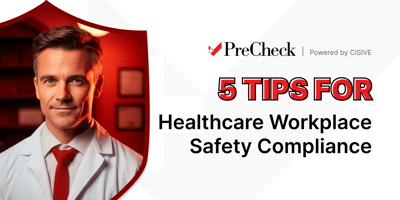
The Occupational Safety and Health Administration (OSHA) governs workplace safety conditions for...